外研版英语九年级上册 Module 9 Unit 1 教案
外研版九年级英语上册M9单元整体教学设计
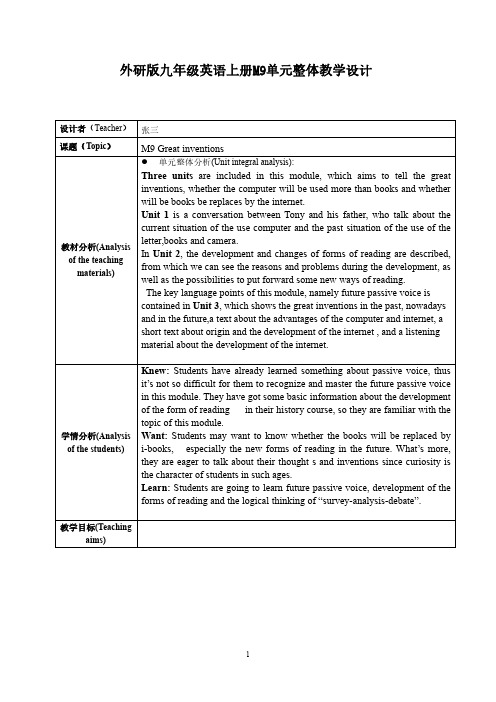
外研版九年级英语上册M9单元整体教学设计设计者(Teacher)张三课题(Topic)M9Great inventions教材分析(Analysis of the teachingmaterials) 单元整体分析(Unit integral analysis):Three units are included in this module,which aims to tell the great inventions,whether the computer will be used more than books and whether will be books be replaces by the internet.Unit1is a conversation between Tony and his father,who talk about the current situation of the use computer and the past situation of the use of the letter,books and camera.In Unit2,the development and changes of forms of reading are described, from which we can see the reasons and problems during the development,as well as the possibilities to put forward some new ways of reading.The key language points of this module,namely future passive voice is contained in Unit3,which shows the great inventions in the past,nowadays and in the future,a text about the advantages of the computer and internet,a short text about origin and the development of the internet,and a listening material about the development of the internet.学情分析(Analysis of the students)Knew:Students have already learned something about passive voice,thus it’s not so difficult for them to recognize and master the future passive voice in this module.They have got some basic information about the development of the form of reading in their history course,so they are familiar with the topic of this module.Want:Students may want to know whether the books will be replaced by i-books,especially the new forms of reading in the future.What’s more, they are eager to talk about their thought s and inventions since curiosity is the character of students in such ages.Learn:Students are going to learn future passive voice,development of the forms of reading and the logical thinking of“survey-analysis-debate”.教学目标(Teachingaims)By the end of this module,students are able to:1.recognize,understand and use the future passive voice,and describe the development of the forms of reading.2.do the survey and find out the ways in which people choose to read and their opinions about whether the books will be replaced by i-books and analyze the reasons why they think so.3.develop new ways to read and write a draft about whether the books will be replaced by i-books.4.work together prepare for the debate and assess groups’works based on the evaluation scale as well as giving some suggestions.5.arouse their curiosity towards inventions and develop the critical thinking.教学重、难点(Key points anddifficulties)Debate about whether the books will be replaced by i-books●Lesson1:do the survey and find out the ways in which people chooseto read and their opinions about whether the books will be replaced by i-books●Lesson2:analyze the reasons and illustrate the mind map applying“survey-analysis”thinking●Lesson3:develop new ways to read with the future passive voice5.Lesson4:write a draft about whether the books will be replaced by i-books and debate on the topic第一单元(Unit1)听说实践(Listening& speaking practice)I.课题(Topic)Unit1Will computers be used more than books in the future?II.教学目标(Teaching aims)By the end of this lesson,students are able to:1.obtain the topic and specific information from the conversation, particularly theinfluence the computer and the internet have,and tease out whether the computer will be used more than books.2.do the survey and find out the ways in which people tend to read.3.draw a graph of the survey and describe it.III.教学重、难点(Key points and difficulties)Key points:1.Obtain the topic and specific information from the conversation,particularly thechanges because of the internet and computer.2.Describe the graph about survey,and draw a conclusion from the graph. Difficult point:Draw a graph of the ways in which people tend to read and describe it.第二单元(Unit2)阅读思考(Reading&thinking)I.课题(Topic)Unit2Will books be replaced by the Internet?II.教学目标(Teaching aims)By the end of this lesson,students are able to:1.obtain the specific information of the cause and effect as well as the reason and result of the development of the forms of reading,2.describ e and analyze the reason why people hold the view whether books will be replaced by the computer.III.教学重、难点(Key points and difficulties)Key points:Obtain the specific information of the cause and effect as well as the reason and result of the development of the forms of reading.Difficult point:Analyze the reason why people hold the view.第三单元(Unit3)语言运用(Language in use)I.课题(Topic)Unit3Language in useII.教学目标(Teaching aims)By the end of this lesson,students are able to:1.develop more ways of the form of reading.2.get to know the development of the internet and analyze the the meaning and the use of passive voice in the passage.3.master the meaning,form and use of the future passive voice.III.教学重、难点(Key points and difficulties)Key points:Master the meaning,form and use of the future passive voice.Difficult points:Develop more ways of the form of reading.第四单元(Unit4)提升评价(Promotion& assessment)课题(Topic)Debate教学目标(Teaching aims)By the end of this lesson,students are able to:1.assess their own and partner’s writing and give some useful suggestions.2.make the draft in groups and present their own work as well as assess other groups’work.3.talk about the development of the reading forms in a new perspective.教学重、难点(Key points and difficulties)Key points:1.Assess their own and partner’s writing and give some useful suggestions2.Make the proposal in groups and present their own work as well as assessother groups’workDifficult pointTalk about the development of the reading forms in a new perspective.教学过程:(Teaching procedures)(第一单元Unit1)听说实践(Listening&speaking practice)环节/时间(Step&Time)教学目标(Objectives)学习活动(Activities)评价(Assessment)Step1-2(5min) 1.Obtain the topic andspecific informationfrom the guessing game2.Arouse the analysisof the influence of theinventions.1.Students guess theinventions according tothe clues.2.Students think aboutmore modern inventionsand decide whichinfluences us the most.1.Observe if studentscan use the clues toguess the inventionsproperly.2.Observe students’understanding theinfluence ofmodern inventionsby listening to theiropinions.设计意图(Purpose):1.Focus on the topic and arouse students’interest,as well as lead into the modern inventions.2.Cultivate their abilities of thinking and talking about the modern inventions and the influence of them.环节/时间(Step&Time)教学目标(Objectives)学习活动(Activities)评价(Assessment)Step3-6(15min)3-6Listen and main ideaand specificinformation of the textand talk about theanalysis ofdevelopment and theinfluence of the internetand computer.3.Students listen andchoose to get the mainidea of the text.4.think and say the basicfunction of the internet.5.listen and answer toget the benefits of theInternet and then thinkabout more specificbenefits of the internet.6.listen and compare thechanged in the past andnowadays because of theinternet.3.Observe if studentscan get the inventionsmentioned correctly.4.Observe if studentscan think of thebenefits of the internet,give some tips ifnecessary.5.Observe if studentscan get the benefits ofthe internet anddescribe the functionsof the internet.6.Observe if studentscan fill in the blankscorrectly to check ifthey get the changes oflife.设计意图(Purpose):Help students to obtain the main idea and specific information of the text and cultivate their competences of obtaining and thinking.环节/时间(Step&Time)教学目标(Objectives)学习活动(Activities)评价(Assessment)Step7-10(20min)7-10.Do a survey onpeople’s opinions onwhether ill computersbe used more thanbooks in the future anddraw a conclusion fromthe survey.7.Students work in groups,think and discuss howour life is influencedbecause of thedevelopment of internetand computer.8.Students summarized theaspects the internet andcomputer have greatinfluence on and then leadto the question whetherwill computers be usedmore than books in thefuture.9.Students discuss ingroups to brainstorm thequestions to design asurvey on whether bookswill be replaced byi-books.7.Observe students’behaviors in groupdiscussion and ifthey can describetheir thoughtscorrectly.8.Observe if theycan think about thequestions for thesurvey and thenmake thequestionnaire.9.Observe if theycan assess other’swork and givesuggestions.10.Analyze theefficiency of thequestionnaire andthe if the way to10.Students collect and analyze the data and then write a report or draw a graph of the survey.present the data is proper.设计意图(Purpose):Lead students to do the activity related to their daily life and beyond the text. Students can use the language to do things in reality.At the same time,it cultivates students’ability of designing questionnaire,collecting the data,analyzing the data and presenting the results.Board Plan:Module9Great inventionsUnit1Will computers be used more than books in the future教学过程:(Teaching procedures)(第二单元Unit2)阅读思考(Reading&thinking)环节/时间(Step&Time)教学目标(Objectives)学习活动(Activities)评价(Assessment)Step1-2(5min) 1.Review the modernand ancient inventions,and lead into the topic-Do you prefer readingbooks on screen,or onpaper?And why?2.Read around theworld and get theadvantages anddisadvantages of thei-book to get ready forthe final debate.1.Students review andget the topic of the unit.2.Students read aroundthe world and get theadvantages anddisadvantages of thei-book to get moreopinions for the finaldebate.1.Observe if studentscan review the modernand ancient inventionsinventions,and givesome clues to helpclassify them to leadinto the topic.2.Observe if studentscan express theiropinions with the keywords so as to decidehow to get them readyfor the debate.设计意图(Purpose):1.Arouse students’interest and motivate them to relate the topic with their daily life.2.Help students to get the topic the passage lead then into thinking in superficial layer.环节/时间(Step&Time)教学目标(Objectives)学习活动(Activities)评价(Assessment)Step3-7(20min) 3.review the use of theChinese ancientinventions and thenread the heading topredict which two ofthe ancient inventionsthe passage mention.4.read and match to getthe main idea of thepassage quickly andthen check if theprediction is right5.scan the text to getthe the development offorms ofreading,especially thepaper and print thenlead into thequestion-Why areand-written books werereplaced by printedbooks.6.Read and choose toget the specificinformation about thereason and result of thedevelopment of thereading forms anddo the extensivereading to get moreinformation about print.7.Read and find out theadjectives that describethe advantages ofthe reading forms withan Internet connection.3.Students predict whichtwo of the ancientinventions the passagemention.4.Students read andmatch to get the mainidea of the passagequickly and then check iftheir predictions areright.3.Students scan the textto get the thedevelopment of forms ofreading,especially thepaper and print thenthink about thequestion-Why areand-written books werereplaced by printedbooks.6.Students read andchoose to get the specificinformation about thereason and result of thedevelopment of thereading forms and thendo the extensive readingto know more aboutprint.7.Students read and findout the adjectives thatdescribe the advantagesofthe reading forms withan Internet connection.3.Observe if they canguess the main ideajust by looking at thepictures and reviewingthe ancient inventions.4.Observe students’behavior when theyread and match to seeif they master thereading tips.5.Observe students’behavior when theyscan to see if theymaster the reading tipsto get the key words.6.Observe if theycould choose thestatements correctlyand organize thedevelopment ofreading formslogically.7.Observe if studentscan find out the keywords and if theirclassifications areproper.设计意图(Purpose):3.Lead students to predict which two of the ancient inventions the passage mention,and get the connection of inventions and the development of the reading form.4.Cultivate students’reading strategy to get main ideas quickly.5.Cultivate students’reading strategy to get specific information quickly.6.Cultivate students’logical thinking ability and set foundation for their critical thinking ability.7.Lead students to find out the key words in different classifications and set foundation for their logical thinking.环节/时间(Step&Time)教学目标(Objectives)学习活动(Activities)评价(Assessment)Step8-10(20min)8.Think and discuss theadvantages anddisadvantages of thebook and the machinewith the connection ofthe internet and chooseone chart to write downreasons and share themwith the partner.9.Do the extensivereading to lead studentsto think further aboutthe topic will books bereplaced by thecomputer.and finish themind map to analyzethe reasons why theythink so and polish theexamples for theopinions.10.Review andsummarize whatstudents have learnt andthen do the assessment.8.Students think anddiscuss the advantages and disadvantages of the bookand the machine with theconnection of the internetand choose one chart towrite down reasons andshare them with thepartner.9.Students do the extensivereading to think furtherabout the topic will booksbe replaced by thecomputer.and finish themind map to analyze thereasons why they think soand polish the examplesfor the opinions.10.After assessinggroups’work,studentsshare their ideas and thenadd or delete something.8.Focus on students’behavior and thecontent when theydiscuss and talk,give somesuggestions ifnecessary.9.Focus onstudents’behaviorand the logicaldemonstration whenthey discuss andfinish the mind map,give somesuggestions ifnecessary.10.Focus onstudents’reflectionwhen they do theassessment,andencourage them tocommunicate theiropinions with eachother.设计意图(Purpose ):8.Guide students to use the chart to do the choice and then give their pinions,as well as cultivate their competence of analyzing.9.Guide students to use the mind map to show their pinions,as well as further cultivate their logical thinking.10.Guide students to express their ideas freely and get some useful information from each other,as well as further cultivate their competence of team-working.Board Plan:Module 9Great inventionsUnit 2Will books be replaced by the Internet?教学过程:(Teaching procedures)(第三单元Unit 3)语言运用(Language in use)环节/时间(Step &Time )教学目标(Objectives )学习活动(Activities )评价(Assessment )Step1-4(20min)1-4Talk about the inventions in the past,nowadays and in the future to let students master the meaning and form of the passive voice in different tenses.1.Students are supposed to work in pairs to talk about the western inventions in the past according to the basic information in the text.2.Students need to review the four great inventions of ancient China,including paper and print,then do a listening about how the forms of the book developed.3.Students talk about the great inventions nowadays including mobile phone,drone and LCD-TV compared with telephone,plane and TV in the past,printer,i-book,GPS1.Observe if students can talk about the western inventions in the past according to the basic information in the text and give some help if students need.2.Observe if students can get the reason why the development of reading form is changed little by little.3.Observe what students can feel about the development of technology and guide them say the usage of these inventions in passive voice.4.Observe if students can get the informationand missile compared with the print,paper,compass and powder in the past.4.Students summarize that they all need the support of the Internet and the WWB,and then students read and complete the development of the WWB and find out the sentences in future passive voice.about the development of the internet and identify the sentences in passive voice.设计意图(Purpose):1.Help students get familiar with the form and use of the passive voice by working in pairs to talk about the western inventions.2.Review the Chinese inventions and do the listening to let students get the reason why the development of reading form is changed little by little.3.Help students clarify the development of the technology.4.Lead students to get to know the meaning and the form of the passive voice.环节/时间(Step&Time)教学目标(Objectives)学习活动(Activities)评价(Assessment)Step5-7(20min)5-7.Summarize the useof the passive voice andtry to use it in differentcontexts.5.Students summarizethe usage of passivevoice and then use it inthe past tense,simpletense and future tenseabout the developmentof the ways we learn.6.Students review andsummarize the structureabout how to introducean invention,whichincludesfunctions,changes itcould bring andcomments of theinvention.7.Students think anddevelop new forms of5.Observe if studentscan get the informationabout thedevelopment of theinternet and identifythe sentences inpassive voice.6.Observe if studentsget the meaning andform of the passivevoice.Explain again ifnecessary.7.Observe if studentsget the use of thepassive voice.Helpthem if necessary.reading in group and dothe presentation.设计意图(Purpose):5.Lead students to summarize the use of the passive voice and clarify the differences among the passive voice in the past tense,simple tense and future tense.6.Lead students to get familiar with the meaning and form of the passive voice.7.Check if students master the passive voice and could apply it into practice properly.Board Plan:Module9Great inventionsUnit3Language in use教学过程:(Teaching procedures)(第四单元Unit4)提升评价(Promotion&assessment)环节/时间(Step&Time)教学目标(Objectives)学习活动(Activities)评价(Assessment)Step1-4(30min) 1.Prepare the firstdraft which shouldinclude the point,thesupporting examplesand the emphasis ofyour opinion.2.Prepare the seconddraft which shouldcontain all the productsin the three lessonssuch as the graph,mind map,writing andpictures.3.Polish the seconddraft and get the third 1.Students need toprepare the first draftwhich should include thepoint,the supportingexamples and theemphasis of youropinion.2.Students need toprepare the second draftwhich should contain allthe products in the threelessons such as thegraph,mind map,writing and pictures.3.Students assess their1.Observe if students’first drafts areincluding the point,thesupporting examplesand the emphasis oftheir opinions.2.Observe if studentscan combine theproducts in three unitsreasonably and givesome suggestions ifnecessary.3.Pay attention to theirevaluation sheet andsee if they can assessdraft which should be corrected according to the evaluation sheet.own writing and thenassess their partner’swriting and give somesuggestions.Then,students modify theirown draft based on theevaluation sheet andtheir partner’ssuggestions.well,then invite someof them to show.Listen to studentsassessment and see ifthey have their ownopinions besides theevaluation scale.设计意图(Purpose):Lead students to assess writing work and cultivate their abilities of assessing and taking other’s suggestions.环节/时间(Step&Time)教学目标(Objectives)学习活动(Activities)评价(Assessment)4.Present their draft in debate as well as assess other groups’work.4.Students present theirdraft in debate as well asassess other groups’work.4.Observe what theymodify and if they cantake their partner’ssuggestions andobserve if everyonehave something to doin their groups andhow they assessothers’works together.Observe their debate tosee if their opinion andassessment arereasonable.设计意图(Purpose):4.Encourage students to work together and use what have learned to show their ideas.Cultivate their ability of assessing.环节/时间(Step&Time)教学目标(Objectives)学习活动(Activities)评价(Assessment)Step5(10min) 5.Work in the group,actas four inventors to sitat the round-table andthen talk about thedevelopment of theform of reading.5.Students could work inthe group,act as fourinventors to sit at theround-table and then talkabout the developmentof the form of reading.5.Observe studentsanswers to see if theycan use the knowledgewhich have learned inthis module to solvethese problems.设计意图(Purpose):Lead students to talk about the development of the reading forms in a new perspective.Board Plan:Module9Great inventionsLesson4Debate and assessment。
外研版九年级英语上册教案 M 9 教学设计
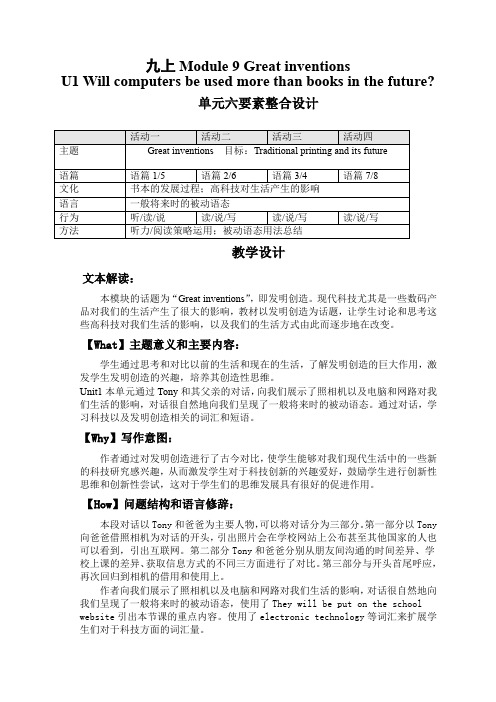
九上Module 9 Great inventionsU1 Will computers be used more than books in the future?单元六要素整合设计教学设计文本解读:本模块的话题为“Great inventions”,即发明创造。
现代科技尤其是一些数码产品对我们的生活产生了很大的影响,教材以发明创造为话题,让学生讨论和思考这些高科技对我们生活的影响,以及我们的生活方式由此而逐步地在改变。
【What】主题意义和主要内容:学生通过思考和对比以前的生活和现在的生活,了解发明创造的巨大作用,激发学生发明创造的兴趣,培养其创造性思维。
Unit1本单元通过Tony和其父亲的对话,向我们展示了照相机以及电脑和网路对我们生活的影响,对话很自然地向我们呈现了一般将来时的被动语态。
通过对话,学习科技以及发明创造相关的词汇和短语。
【Why】写作意图:作者通过对发明创造进行了古今对比,使学生能够对我们现代生活中的一些新的科技研究感兴趣,从而激发学生对于科技创新的兴趣爱好,鼓励学生进行创新性思维和创新性尝试,这对于学生们的思维发展具有很好的促进作用。
【How】问题结构和语言修辞:本段对话以Tony和爸爸为主要人物,可以将对话分为三部分。
第一部分以Tony 向爸爸借照相机为对话的开头,引出照片会在学校网站上公布甚至其他国家的人也可以看到,引出互联网。
第二部分Tony和爸爸分别从朋友间沟通的时间差异、学校上课的差异、获取信息方式的不同三方面进行了对比。
第三部分与开头首尾呼应,再次回归到相机的借用和使用上。
作者向我们展示了照相机以及电脑和网路对我们生活的影响,对话很自然地向我们呈现了一般将来时的被动语态,使用了They will be put on the school website引出本节课的重点内容。
使用了electronic technology等词汇来扩展学生们对于科技方面的词汇量。
外研英语九年级上册Module 9Unit1公开课一等奖优秀课件
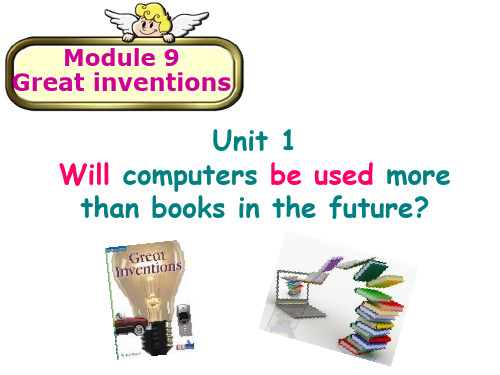
借;借入
pay attentio拍n一to些th照e 片wo收rd到s a…nd的信 公布;张贴 expressions
成千上万的
满的;充满的
存储卡,内存卡
这可以解决。
lend sth to sb/lend sb sth 把某物借给/借出
Translate the following expressions into English.
(把某物)借出, 借给 lend sth to sb/lend sb sth 好几千, 成千上万 thousands of 张贴, 公布 put up 借入, 借来 borrow 拍照 take photos 收到……的来信 hear from 内存卡;存储卡 memory card 这可以解决。 That can be fixed.
empty memory card.
3. I will do what you tell me to do.
Promise!
Task 5
P72 Tony wants to borrow his father’s cam3eRraeaadntdhetaskuemsmomarey opfhtohteos of the schooocinlnodftnohavrenmecsrasectahiaotoinnoodnal .nvtUhidsneictdobteorarrlsetikhnceeet timttbh.auelslwemruomantgch. The photos will be shown ionnththeesscchhooooll mwaegbasziitnee. Tony’s dad lends the camera.
which mean:
1. Changing the subject, can I get the camera?
2016外研版九年级英语(上)Module9 unit1教案
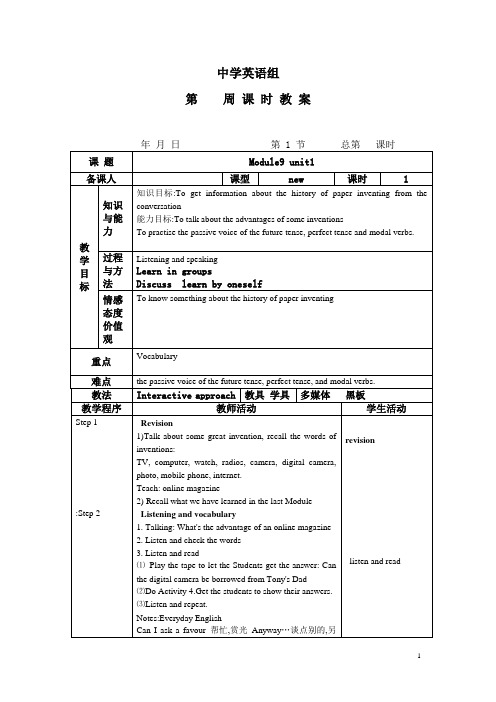
1
Step3 Step4 Step5
外
Here it is. 给你,在这儿 It doesn't matter. 没关系 I'll see to that. 我会处理的. Is that clear 清楚吗 懂了 吗 Promise! 我一定!
language Points
1) Paper and printing have been used for ages. for ages ---- for (many) years 好多年了. 类似短语: for hours/ days/months 等.
Interactive approach 教具 学具 多媒体Leabharlann 黑板教师活动学生活动
Revision 1)Talk about some great invention, recall the words of inventions: TV, computer, watch, radios, camera, digital camera, photo, mobile phone, internet. Teach: online magazine 2) Recall what we have learned in the last Module Listening and vocabulary 1. Talking: What's the advantage of an online magazine 2. Listen and check the words 3. Listen and read ⑴ Play the tape to let the Students get the answer: Can
Listen and repeat
Module9Unit1课件英语九年级上册
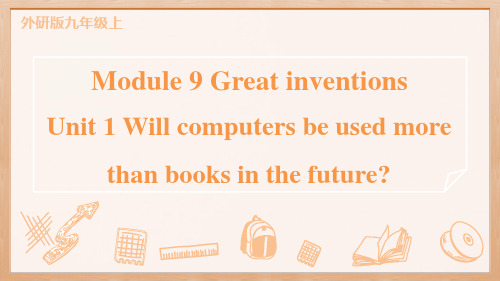
基础题·夯实基础
7. What were you _m__a_i_n_ly_ (main) talking about during this boring journey? 【解析】此处修饰动词短语talking about, 所以用副词, main 的副词形式为mainly 表示“主要地”, 故填mainly.
答案呈现
27 D 28 C 29 D 30 B 31 A
基础题·夯实基础
一、根据句意及汉语提示填空 1. Before you take the medicine, you need to read the _in_s_t_r_u_c_ti_o_n_s (说明书). 2. [学科素养学习能力] I often visit some _w_e_b_s_it_e_s (网站) to look for the information I need.
返回
基础题·夯实基础
3. This bag was __f_u_l_l _ (满的), but it is empty now. 4. What will you do if the _m__e_m_o_r_y_ (存储器) card of your
mobile phone is broken? 5. My friend helps me create a Facebook __p_a_g_e_ (页面) called
返回
基础题·夯实基础
10. What do you think is the most important _in__v_en__ti_o_n(invent) in human history? 【解析】分析句子结构可知设空处应用invent 的名词形 式; 根据is 可知此处应用单数形式. 故填invention.
外研版英语九年级上册(教学设计)Module 9 Unit 1
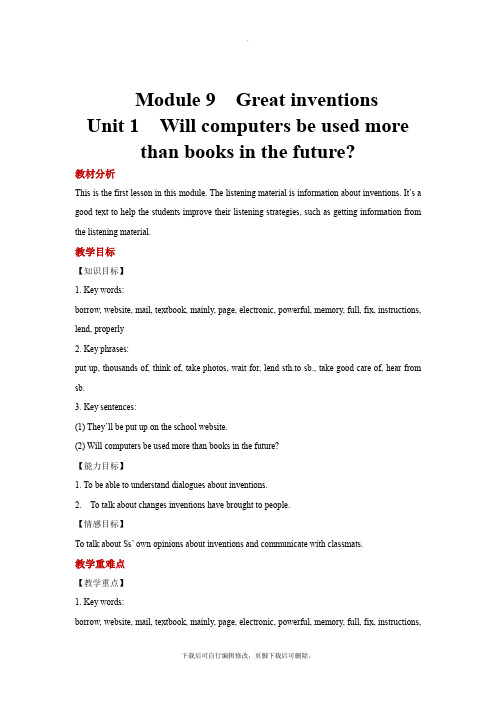
Module 9Great inventions Unit 1Will computers be used more than books in the future?教材分析This is the first lesson in this module. The listening material is information about inventions. It’s a good text to help the students improve their listening strategies, such as getting information from the listening material.教学目标【知识目标】1. Key words:borrow, website, mail, textbook, mainly, page, electronic, powerful, memory, full, fix, instructions, lend, properly2. Key phrases:put up, thousands of, think of, take photos, wait for, lend sth.to sb., take good care of, hear from sb.3. Key sentences:(1) They’ll be put up on the school website.(2) Will computers be used more than books in the future?【能力目标】1. To be able to understand dialogues about inventions.2. To talk about changes inventions have brought to people.【情感目标】To talk about Ss’ own opinions about inventions and communicate with classmats.教学重难点【教学重点】1. Key words:borrow, website, mail, textbook, mainly, page, electronic, powerful, memory, full, fix, instructions,lend, properly2. Key phrases:put up, thousands of, think of, take photos, wait for, lend sth.to sb., take good care of, hear from sb.3. Key sentences:(1) They’ll be put up on the school website.(2) Will computers be used more than books in the future?【教学难点】To improve listening and speaking abilities.课前准备Multimedia教学过程Step I Warming up and leading in(I) Warm up(A) T introduces four great inventions in ancient China: compass, paper-making gunpowder and printing.(B) T: With the electronic technology, we have more electronic inventions.Ss name more electronic inventions and talk about them.(II) IntroductionWork in pairs. Look at the pictures and answer the questions.(III) PracticeListen and complete the sentences.【设计意图】通过对图片的直观观察和讨论以及对问题的答复,使学生熟悉相关词汇,熟悉本单元话题,并导入新课。
外研版(一起)六年级英语上册《Module9Unit1》教案设计
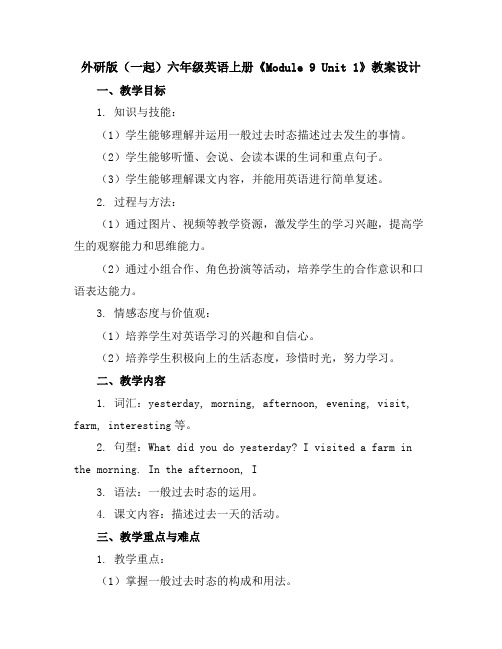
外研版(一起)六年级英语上册《Module 9 Unit 1》教案设计一、教学目标1. 知识与技能:(1)学生能够理解并运用一般过去时态描述过去发生的事情。
(2)学生能够听懂、会说、会读本课的生词和重点句子。
(3)学生能够理解课文内容,并能用英语进行简单复述。
2. 过程与方法:(1)通过图片、视频等教学资源,激发学生的学习兴趣,提高学生的观察能力和思维能力。
(2)通过小组合作、角色扮演等活动,培养学生的合作意识和口语表达能力。
3. 情感态度与价值观:(1)培养学生对英语学习的兴趣和自信心。
(2)培养学生积极向上的生活态度,珍惜时光,努力学习。
二、教学内容1. 词汇:yesterday, morning, afternoon, evening, visit, farm, interesting等。
2. 句型:What did you do yesterday? I visited a farm in the morning. In the afternoon, I3. 语法:一般过去时态的运用。
4. 课文内容:描述过去一天的活动。
三、教学重点与难点1. 教学重点:(1)掌握一般过去时态的构成和用法。
(2)学会用英语描述过去一天的活动。
2. 教学难点:(1)一般过去时态的动词变化。
(2)时间状语yesterday, this morning, this afternoon,this evening的运用。
四、教具与学具准备1. 教具:PPT、图片、视频、录音机等。
2. 学具:英语课本、练习册、文具等。
五、教学过程1. 导入:通过歌曲或游戏,激发学生的学习兴趣,引入本课主题。
2. 新课呈现:利用图片、视频等教学资源,展示课文内容,引导学生学习生词和句子。
3. 操练:通过小组合作、角色扮演等活动,让学生练习本课的句型和词汇。
4. 巩固:设计相关练习,检测学生对本课内容的掌握程度。
5. 作业布置:布置适量的课后作业,巩固所学知识。
外研版初中九年级上册英语 Module 9【早读手册】 Unit 1 早读手册
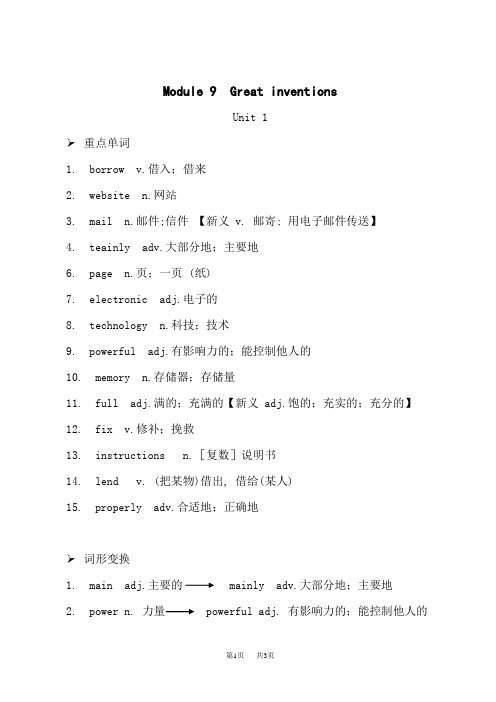
Module 9 Great inventionsUnit 1➢重点单词1. borrow v.借入;借来2. website n.网站3. mail n.邮件;信件【新义 v. 邮寄; 用电子邮件传送】4. teainly adv.大部分地;主要地6. page n.页;一页 (纸)7. electronic adj.电子的8. technology n.科技;技术9. powerful adj.有影响力的;能控制他人的10. memory n.存储器;存储量11. full adj.满的;充满的【新义 adj.饱的;充实的;充分的】12. fix v.修补;挽救13. instructions n.[复数]说明书14. lend v. (把某物)借出, 借给(某人)15. properly adv.合适地;正确地➢词形变换1. main adj.主要的 mainly adv.大部分地;主要地2. power n. 力量 powerful adj. 有影响力的;能控制他人的3. lend v. (把某物)借出,借给 (某人) 反义词 borrowv. 借入;借来4. proper adj. 合适的;适当的 properlyadv.合适地;正确地➢重点短语1. take photos 照相2. put up 张贴;公布3. on the Internet 在网上4. wait for 等待5. hear from 收到……的来信6. in the future 在将来7. in the past 在过去8. thousands of 好几千;成千上万9. electronic technology 电子技术10. memory card 存储卡11. take (good) care of (好好)照顾➢重点句型1. 它们将被公布在学校的网站上。
They’ll be put up on the school website.2. 那可以解决。
外研版九年级英语上册课件:Module 9 Unit 1 (共31张PPT)
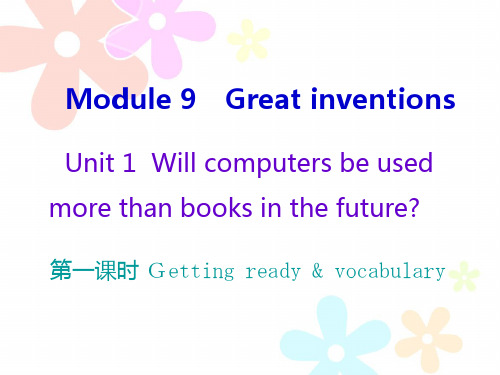
二、根据汉语意思补全下列句子,每空一词 1. 昨天他把布告张贴在墙上了。 He __p_u_t__ __u_p__ the notice on the wall yesterday. 2.他可以用这么一大笔钱去帮助成千上万的孩子。 He could help __t_h_o_u_s_a_n_d_s__ ___o_f_ children with such a large amount of money. 3.我很久没有收到我叔叔的来信了。 I haven't __h_e_a_r_d__ __f_r_o_m___ my uncle for a long time.
我对他的谈话做了几页笔记。 Please turn to Page Ten. 请翻到第10页。
应用
( B )Please turn to Page ______ and read the
_______ story.
A.Ten; two
B. Ten; second
C.Tenth; second
D. Tenth; two
爸爸,我能借用你的相机吗? 它们(照片)将被公布在学校的网站上。
其他班的同学,甚至生活在其他国家的人 也能在因特网上看到它们。
一些书很厚,有上千页。
•9、要学生做的事,教职员躬亲共做;要学生学的知识,教职员躬亲共学;要学生守的规则,教职员躬亲共守。2021/9/82021/9/8Wednesday, September 08, 2021 •10、阅读一切好书如同和过去最杰出的人谈话。2021/9/82021/9/82021/9/89/8/2021 1:49:15 PM •11、只有让学生不把全部时间都用在学习上,而留下许多自由支配的时间,他才能顺利地学习……(这)是教育过程的逻辑。2021/9/82021/9/82021/9/8Sep-218-Sep-21 •12、要记住,你不仅是教课的教师,也是学生的教育者,生活的导师和道德的引路人。2021/9/82021/9/82021/9/8Wednesday, September 08, 2021
外研版英语九年级上册模块1--Unit-3复习课教案
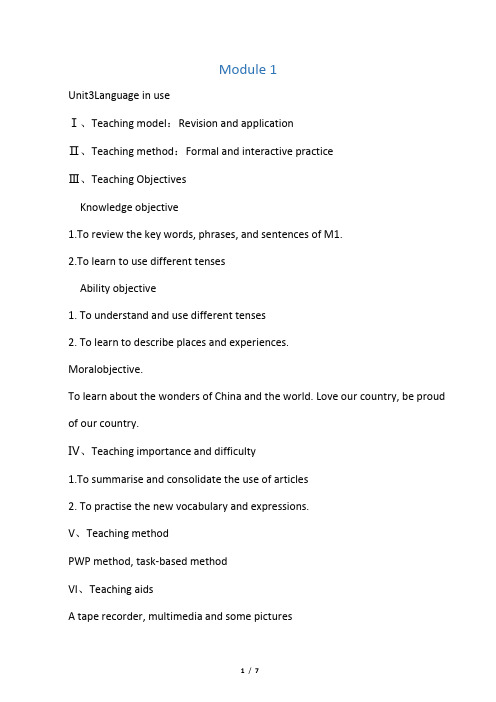
Module 1Unit3Language in useⅠ、Teaching model:Revision and applicationⅡ、Teaching method:Formal and interactive practiceⅢ、Teaching ObjectivesKnowledge objective1.To review the key words, phrases, and sentences of M1.2.To learn to use different tensesAbility objective1. To understand and use different tenses2. To learn to describe places and experiences.Moralobjective.To learn about the wonders of China and the world. Love our country, be proud of our country.Ⅳ、Teaching importance and difficulty1.To summarise and consolidate the use of articles2. To practise the new vocabulary and expressions.V、Teaching methodPWP method, task-based methodVI、Teaching aidsA tape recorder, multimedia and some picturesⅦ、Teaching ProceduresLearning Aims(学习目标)1.To review the key words, phrases, and sentences of M92.To use articles3. To learn to read large numbersStep 1:Review the knowledge(知识回顾)1.师友互查1)Review the phrasesgo through, fall away, on top of, look over, look across, look down,get out of , join in, agree with, man-made, more than, millions of,in one’s opinion2)课文原句在现1. I got out of the car, went through a gate and walked along a dark path.2. I looked over them, but it was silentand there was no sign of it.3. I looked down to the Colorado River4. Finally, I looked to my left and to my right.5. The sun rose behind me and shone ontherocks.Farbelowme,thegroundfell away and down to a river.6. I remained by the canyon for a bout half an hour…7.Let’s callWonder of the Worldand join in the discussion.8.I think the Giant’s Causeway is the most fantastic natural wonder.9. I think Victoria Falls in Africa is even more fantastic.10. But in my opinion, man-made wonders are more exciting than natural ones.(友情提示:师友朗读,理解记忆。
Module9Unit1(知识精讲练习)九年级英语上册精品讲义(学生版)
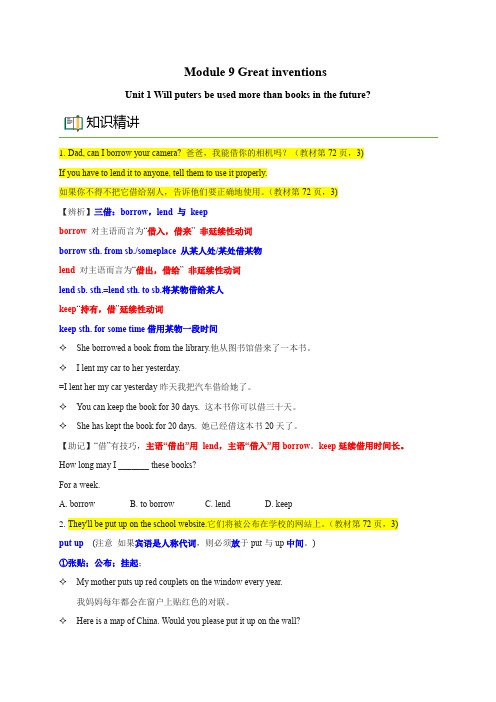
Module 9 Great inventionsUnit 1 Will puters be used more than books in the future?知识精讲1.Dad, can I borrow your camera? 爸爸,我能借你的相机吗?(教材第72页,3)If you have to lend it to anyone, tell them to use it properly.如果你不得不把它借给别人,告诉他们要正确地使用。
(教材第72页,3)【辨析】三借:borrow,lend 与keepborrow对主语而言为“借入,借来” 非延续性动词borrow sth. from sb./someplace 从某人处/某处借某物lend对主语而言为“借出,借给” 非延续性动词lend sb. sth.=lend sth. to sb.将某物借给某人keep“持有,借”延续性动词keep sth. for some time借用某物一段时间✧She borrowed a book from the library.他从图书馆借来了一本书。
✧I lent my car to her yesterday.=I lent her my car yesterday昨天我把汽车借给她了。
✧You can keep the book for 30 days. 这本书你可以借三十天。
✧She has kept the book for 20 days. 她已经借这本书20天了。
【助记】“借”有技巧,主语“借出”用lend,主语“借入”用borrow。
keep延续借用时间长。
How long may I _______ these books?For a week.A. borrowB. to borrowC. lendD. keep2.They'll be put up on the school website.它们将被公布在学校的网站上。
外研版初中英语九年级上册全册教学设计教案
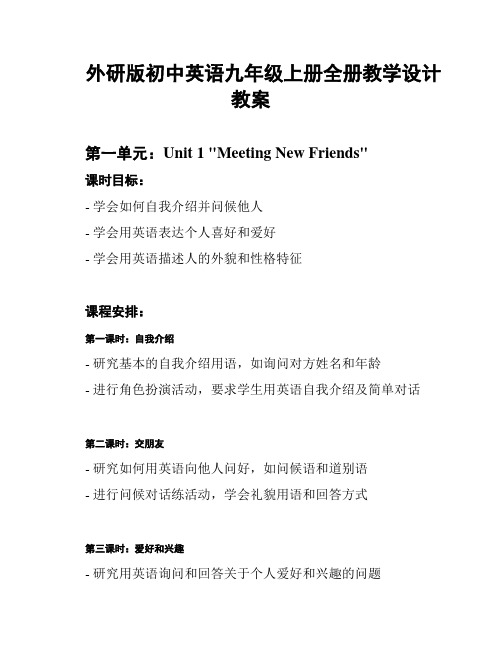
外研版初中英语九年级上册全册教学设计
教案
第一单元:Unit 1 "Meeting New Friends"
课时目标:
- 学会如何自我介绍并问候他人
- 学会用英语表达个人喜好和爱好
- 学会用英语描述人的外貌和性格特征
课程安排:
第一课时:自我介绍
- 研究基本的自我介绍用语,如询问对方姓名和年龄
- 进行角色扮演活动,要求学生用英语自我介绍及简单对话
第二课时:交朋友
- 研究如何用英语向他人问好,如问候语和道别语
- 进行问候对话练活动,学会礼貌用语和回答方式
第三课时:爱好和兴趣
- 研究用英语询问和回答关于个人爱好和兴趣的问题
- 研究常用的动词和形容词,用于描述自己的爱好和兴趣
第四课时:人的外貌和性格
- 研究基本的描绘人的外貌和性格的词汇和表达方式
- 进行描述人物的活动,学生互相描绘对方的外貌和性格特征
教学资源:
- 课本:外研版初中英语九年级上册
- 角色扮演卡片
- 录音设备
评估方式:
- 口语表达能力评估:根据学生的自我介绍和对话表现评估其口语表达能力
- 书面作业评估:布置写作作业,学生需写一篇关于自己的爱好和兴趣的短文
注意事项:
- 强调学生的参与和互动,鼓励他们多与同桌进行对话练
- 为学生提供充足的练机会,以提高口语表达能力
- 鼓励学生积极参与描述人物的活动,培养他们的观察能力和用词准确性。
外研版英语九年级上册Module9 Unit1 精品教案
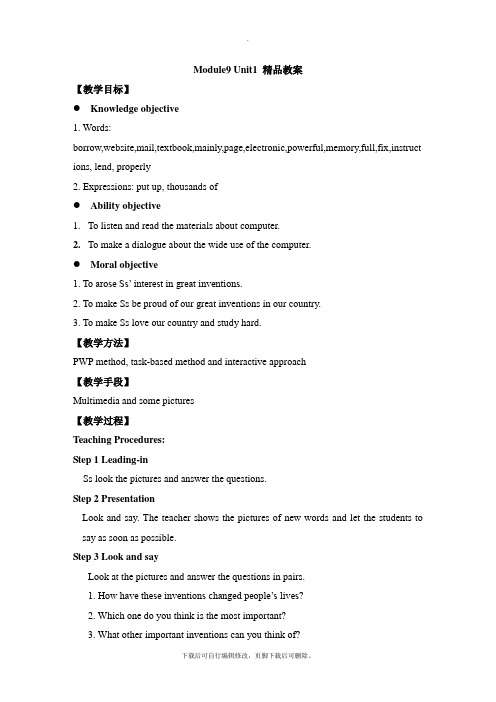
Module9 Unit1 精品教案【教学目标】●Knowledge objective1. Words:borrow,website,mail,textbook,mainly,page,electronic,powerful,memory,full,fix,instruct ions, lend, properly2. Expressions: put up, thousands of●Ability objective1.To listen and read the materials about computer.2.To make a dialogue about the wide use of the computer.●Moral objective1. To arose Ss’ interest in great inventions.2. To make Ss be proud of our great inventions in our country.3. To make Ss love our country and study hard.【教学方法】PWP method, task-based method and interactive approach【教学手段】Multimedia and some pictures【教学过程】Teaching Procedures:Step 1 Leading-inSs look the pictures and answer the questions.Step 2 PresentationLook and say. The teacher shows the pictures of new words and let the students to say as soon as possible.Step 3 Look and sayLook at the pictures and answer the questions in pairs.1. How have these inventions changed people’s lives?2. Which one do you think is the most important?3. What other important inventions can you think of?Step 4 ListeningⅠ. Listen and complete the sentences.1Linging loves her mobile phone because she can ______________.2All of Daming’s friends’ numbers are _______ in his phone.3Today’s cameras are better than old cameras because they do not ________ and the photos can ______________.4Lingling thinks everything ___________ by computer to some degree, so the computer is __________________ invention.Ⅱ. Listen to Part 3 and answer the following questions.1. What will Tony do on the school visit to the museum?2. Where did we get mainly information in the past?Step 5 Reading1.Find out the sentences which belong to the passive voice in the dialogue.1). They’ll be put up on the school website.2). And they can be seen on the Internet by other classes.3). Will computers be used more than books in the future?2.Now read the summary of the conversation. Underline the wrong informationand correct it.Tony wants to borrow his father’s camera and take some photos of the school dance and the basketball match. The photos will be shown in the school magazine. Tony’s dad lends the camera. He promises Tony to look after it.3.Find the sentences in the conversation which mean:1) Changing the subject, can I get the camera?2). It is not a problem. I will use another memory card.3) I will do what you tell me to do.4.Answer the questions.electronic fix instruction invention lend mail page website1) How do you fix a camera if the memory is full?2) When do you need to read the instructions?3) How often do you send messages by mail?4) How many pages does this book have?5) Which website do you often go to when you get online?6) What is an example of electronic technology?7) When you lend something to someone, what do they have to do later?8) What do you think is the most important invention in human history? Step 6 Everyday EnglishLet Ss say the everyday English that they have learnt in the passage.•I wonder …•Perhaps.•Here it is.•Promise!Step 7 Language points1. Can I borrow your camera?borrow表示“借入〞lend表示“借出〞borrow sth. from sb. 表示“向某人借某物〞。
新外研版英语九年级上册教案Module9Unit1
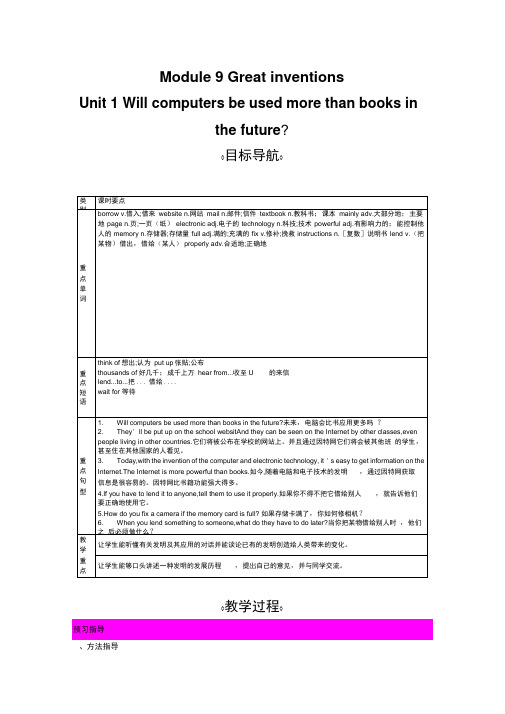
Module 9 Great inventionsUnit 1 Will computers be used more than books inthe future?◊目标导航◊◊教学过程◊1•预习Page 72的生词,做到会读并知意。
2. 预习并讨论Activity 1中的3个问题。
二、预习检测I .根据句意用所给词的适当形式填空1.ln some coun tries,tea is served (serve) with milk and sugar.2. His room isn ' t cleaned/clean(not clean) every day.3. Are her clothes washed (wash) very often?4. He is seen (see) to play football on the playgro und every Sun day morning.5. Who is the baby looked (look) after by?n .按要求完成句子,每空一词1. Mr Green asks the students to speak English in class.(改为被动语态)The students are asked to speak English in class by Mr Green.2. They use the machine for washing clothes.(改为被动语态)The mach in e is used for wash ing clothes by them.3. The boy broke the glass this morning.(改为被动语态)The glass was broken by the boy this morning.4.Students are allowed to ride in the school.(改为否定句)Students aren 't allowed to ride in the school.川.单项填空(B) 1. —Look at the sig n on the right.—Oh,parki ng ______ here.A.doesn ' t allowB.isn ' t allowedC.didn ' t allowD.wasn' t allowed(C) 2.These days stude nts in some schools _____ not to use mobile phon es.A.askB.askedC.are askedD.were asked(D) puters _____ widely in our daily life.eedC.were usedD.are used(A)4.He likes reading very much.Most of his money ________ on books.A.is spe ntB.spe ndC.spe ndsD.are spe nt(A)5.The young man was ofte n seen _______ by the lake.A.to drawB.to draw ingStep 1情景导入Teacher:Let ' s play a guessing gam elescribe an object and you guess what it is,OK? Step 2完成教材Activity 1和Activity 2的任务1. 让学生看Activity 1中的三幅图片并回答问题。
外研版英语九年级上册Module1教案
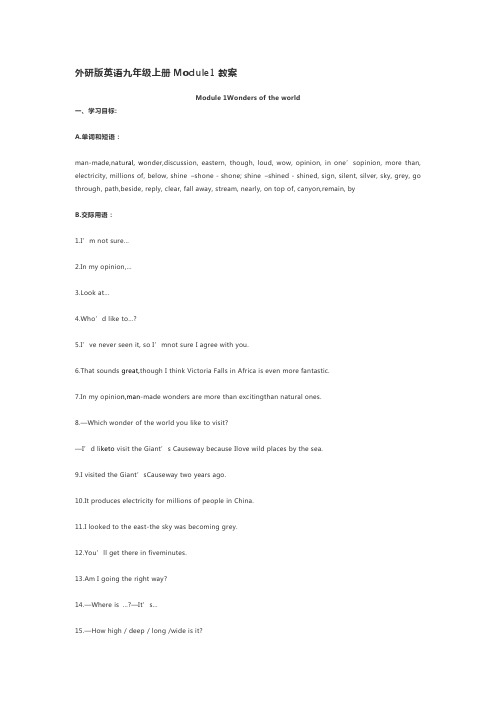
外研版英语九年级上册Module1教案Module1Wonders of the world一、学习目标:A.单词和短语:man-made,natu ral, w onder,discussion, eastern, though, loud, wow, opinion, in one’sopinion, more than, electricity, millions of, below, shine –shone - shone; shine –shined - shined, sign, silent, silver, sky, grey, go through, path,beside, reply, clear, fall away, stream, nearly, on top of, canyon,remain, byB.交际用语:1.I’m not sure…2.In my opinion,…3.Look at…4.Who’d like to…?5.I’ve never seen it, so I’mnot sure I agree with you.6.That sounds great,though I think Victoria Falls in Africa is even more fantastic.7.In my opinio n,man-made wonders are more than excitingthan natural ones.8.—Which wonder of the world you like to visit?—I’d li keto visit the Giant’s Causeway because Ilove wild places by the sea.9.I visited the Giant’sCauseway two years ago.10.It produces electricity for millions of people in China.11.I looked to the east-the sky was becoming grey.12.You’ll get there in fiveminutes.13.Am I going the right way?14.—Where is …?—It’s…15.—How high / deep / long /wide is it?—It’s…meters high / deep / long/ wide.二.教学目标1.Function: Describing places and experiences.2. Structure:Compa rison of past simple, present simple,future simple, present perfect, present continuous, past continuous.3.Skills: 1) Listening for specific information; identifying photos.2) Expressing views and opinions.3) Reading and finding specific information .4) Describing a wonder of the world.4.Around the world: Stonehenge: A man-made wonder of the world..5.Task: Making a poster about a wonder of the world.三、重点及难点:Grammar: Co mparis onof past simple, present simple, future simple, present perfect,present continuous, past continuous.四、教学设计:Unit 1It’s more than2,000 years old.ⅠTeaching modelListeningand speakingⅡTeaching methodTop-down approachⅢTeaching aims1.To learn and u nderstandthe topic words through talking and listening;3.Match the names of the wonders with the pictures.4.Ask the students to check their answer with a partner.5.Call back the answers from the whole class and check the answers.Step3 Answer the questions.Looka t the picturesand answer the questions. Use the words in the box to help you.1. Ask the students to look at thepictures in Activity1.2.Ask the students to read through the wordsin the box.ancient man-made modern natural wonder3.Ask the students to read through thequestions in Activity 2.1) Which two are natural wonders?2) Which two are man-made wonders?3) Which is an ancient wonder?4) Which is a modern wonder?4. Look at th epict ures and answer the questions. Use thewords in the box to help you.5.Ask the students to check their answer with a partner.6.Call back the answers from the whole class and check the answers.7.Now listen and check.Step4 Listen and read.1.Ask the students to listen and readthe conversation silently.2.Check(√)thetrue sentences.1) Tony thinks the Giant’sCauseway is the largest natural wonder.2) Lingling t hinks Victoria Falls is more fantasticthan the Giant’sCauseway.3) Betty and Daming are more interested in man-madewonders.4) For Dami ng,th e Three Gorges Dam is morefantastic than the Terracotta Army.3.Ask the students toread the passage and finish Activity4.1) Where is the Giant’sCauseway?2) How wide is Victoria Falls?3) What wonders does Betty think are more exciting?4) How old is the Terracotta Army?4.After Reading: Complete the table.WondersThe Giant’s Cause way ______ rocks, ____ sides, on the ______ coast of Northern Irel andVictoria Falls in ______, ______ metres wide, _____ metres highThe Terracotta Armymore than ______ years oldThe Three Gorges Dam ______ metres long, _____ metres high, ____ metres wide, pr oduce _________Step5Pronunciation and speaking:Listenand mark the pauses.1.Play the recording once without stopping.2. Play the recording again and ask the whole class torepeat.1) I’venever seen it, so I’mnot sure I agree with you.2) That soun dsgre at, though I think VictoriaFalls in Africa is even more fantastic.3) In my opin ion,m an-made wonders are more excitingthan natural ones.3.Ask the students to listenand mark the pauses.4.Now listen again andrepeat.Step6Language points1.Let’s call Wonder of theWorld and join in the discussion.我们给《世界奇观》节目打电话,加入讨论吧。
最新外研版九年级英语上册教案(全一册 共91页)
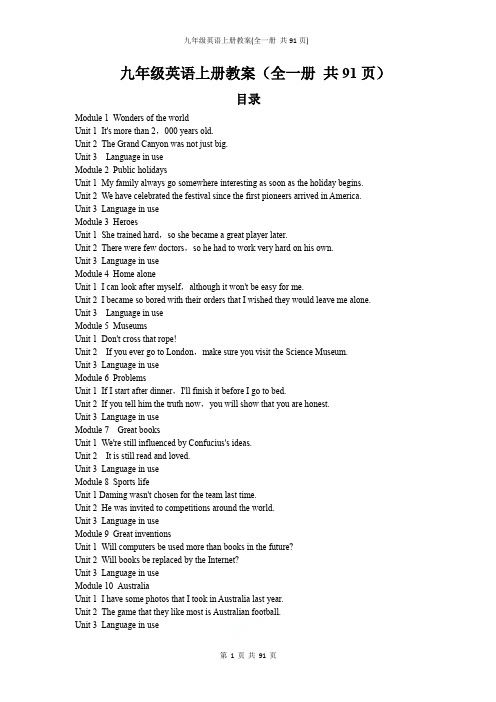
九年级英语上册教案(全一册共91页)目录Module 1Wonders of the worldUnit 1It's more than 2,000 years old.Unit 2The Grand Canyon was not just big.Unit 3Language in useModule 2Public holidaysUnit 1My family always go somewhere interesting as soon as the holiday begins.Unit 2We have celebrated the festival since the first pioneers arrived in America.Unit 3Language in useModule 3HeroesUnit 1She trained hard,so she became a great player later.Unit 2There were few doctors,so he had to work very hard on his own.Unit 3Language in useModule 4Home aloneUnit 1I can look after myself,although it won't be easy for me.Unit 2I became so bored with their orders that I wished they would leave me alone. Unit 3Language in useModule 5MuseumsUnit 1Don't cross that rope!Unit 2If you ever go to London,make sure you visit the Science Museum.Unit 3Language in useModule 6ProblemsUnit 1If I start after dinner,I'll finish it before I go to bed.Unit 2If you tell him the truth now,you will show that you are honest.Unit 3Language in useModule 7Great booksUnit 1We're still influenced by Confucius's ideas.Unit 2It is still read and loved.Unit 3Language in useModule 8Sports lifeUnit 1 Daming wasn't chosen for the team last time.Unit 2He was invited to competitions around the world.Unit 3Language in useModule 9Great inventionsUnit 1Will computers be used more than books in the future?Unit 2Will books be replaced by the Internet?Unit 3Language in useModule 10AustraliaUnit 1I have some photos that I took in Australia last year.Unit 2The game that they like most is Australian football.Unit 3Language in useModule 11PhotosUnit 1He's the boy who won the photo competition last year!Unit 2The photo which we liked best was taken by Zhao Min.Unit 3Language in useModule 12Save our worldUnit 1If everyone starts to do something,the world will be saved.Unit 2Repeat these three words daily:reduce,reuse and recycleUnit 3Language in useModule 1Wonders of the worldUnit 1It's more than 2,000 years old.【教学思路】本单元的教学内容是第一模块中的第一单元,通过提供必要的图片、背景等为学生创造一个全新的语言氛围。
外研版英语九年级上册ModuleUnit教学课件1
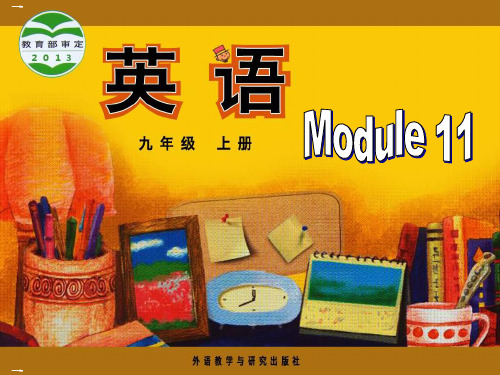
外 研 版 英 语 九年级 上册Mo duleUn it1
What does the photo show?
Students are running.
外 研 版 英 语 九年级 上册Mo duleUn it1
外 研 版 英 语 九年级 上册Mo duleUn it1
What does the photo show?
外 研 版 英 语 九年级 上册Mo duleUn it1
3. What does Daming suggest Tony should do? A. Take some photos of Beijing B. Add some photos of Cambridge that Tony took recently C. Both A and B
外 研 版 英 语 九年级 上册Mo duleUn it1
Read and complete the table Information Card
The person who wants to beat He Zhong
1 Tony
The subjects this year
2 Nature, Home and
17. 我有感觉我们能够解决这些小问题。 I have a feeling that we can
__s_o_l_v_e_t_h_e_s_e__l_it_t_le__d_i_f_fi_c_u_l_t_ie_s___.
外 研 版 英 语 九年级 上册Mo duleUn it1
外 研 版 英 语 九年级 上册Mo duleUn it1 外 研 版 英 语 九年级 上册Mo duleUn it1
13. be in with a chance to do sth. 有可能/机会做某事 I think I am in with a chance to pass this test. 我认为,我有可能通过这次测试。
外研版初中九年级上册英语精品教案 Module 9 Unit 1 第二课时
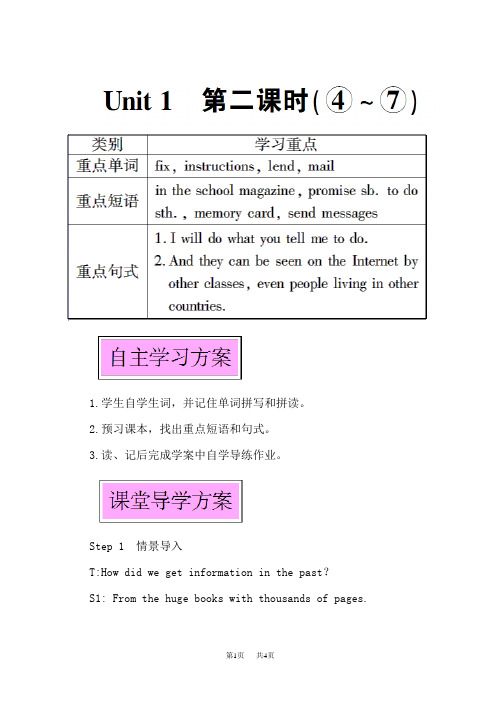
1.学生自学生词,并记住单词拼写和拼读。
2.预习课本,找出重点短语和句式。
3.读、记后完成学案中自学导练作业。
Step 1 情景导入T:How did we get information in the past?S1: From the huge books with thousands of pages.T: What about now?S2: On the Internet.T: We can also get it on mobile phone. Is it right?Ss: Yes.Step 2 完成教材Activities 4,5的任务1.Find the sentences in the conversation which mean:(Activity 4)(1)学生个体活动,读懂题目中句子的意思。
(2)学生读对话,找到意思相同的语句,并在语境中体会句子含义。
(答案:Answers:1.Anyway, about the camera…?2.OK. That can be fipty memory card.3.Promise!)2.Answer the questions. (Activity 5)(1)学生个体活动,朗读问题并回答。
(2)教师点名,个体汇报。
Step 3 小结训练(A)1. He promised me __________me a call every day.A.to giveB. giveC. givingD. lend(B)2.Your memory card is _________,please use another one.A. fillB. fullC. oldD. filling(C)3. Do you _________ mail or mobile phone?A. send messages onB. send message withC. send messages byD. send information byStep 4 完成教材Activities 6,7的任务1.Listen and mark the pauses. Now listen again and repeat. (Activity 6)(1)学生个体活动,听录音,注意意群之间的停顿。
外研版九年级英语上册Module 9 Unit 1(含音频)
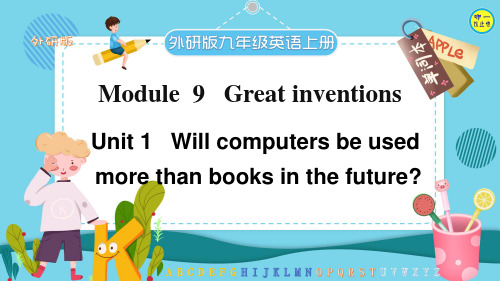
3. What does he say to Tony? He says Tony must take care of the camera.
True or false
1. When Tony’s dad was young, he always waited for a long time to hear from his pen
2 Which one do you think is the most important ?
3 What other important inventions can you think of ?
2 Listen and complete the sentences. 1 Lingling loves her mobile phone because she can
4 Lingling thinks everything _w_a_s__c_h_a_n_g_e_d_____ by computers to some degree, so the computer is _t_h_e_m__o_s_t_i_m_p_o_r_t_a_n_t__ invention.
2 WInenhweeenmddatoochyrieonauednoterheIedmitnoesetrrteuascodtmitohenepsirbnoesbtfroluermcetsiIo.unsse?a 3 HI osewndofmteensdsaogyeosubysemndaiml eevsesraygedsabyy. mail?
Dad: Perhaps. In the past, we mainly got
- 1、下载文档前请自行甄别文档内容的完整性,平台不提供额外的编辑、内容补充、找答案等附加服务。
- 2、"仅部分预览"的文档,不可在线预览部分如存在完整性等问题,可反馈申请退款(可完整预览的文档不适用该条件!)。
- 3、如文档侵犯您的权益,请联系客服反馈,我们会尽快为您处理(人工客服工作时间:9:00-18:30)。
Module 9 Great inventionsUnit 1 Will computers be used more than booksin the future?教学目标【知识目标】1.词汇website, mail, page, electronic, full, fix, memory, instruction, lend, properly2.一般将来时的被动语态3.一般现在时、一般过去时及一般将来时的被动语态用法总结【能力目标】能听懂有关发明及其应用的文章,并能使用被动语态谈论某种物品发明的时间、发明人及用途;能运用被动语态描写自己最喜爱的发明物。
【情感态度目标】培养发明创造精神,从而进一步认识世界和改造世界。
教学重难点【教学重点】1.领会并灵活使用下列词汇website,mail,page,electronic,full,fix,memory,instruction, lend, properly2.一般将来时的被动语态及其各种句式【教学难点】能听懂有关发明及其应用的文章,并能使用各个时态的被动语态谈论某种物品发明的时间、发明人及用途。
教学过程Step 1 Leading-inSs look the pictures and answer the questions.Step 2 PresentationLook and say. The teacher shows the pictures of new words and let the students to sayas soon as possible.Step 3 Look and sayLook at the pictures and answer the questions in pairs.1. How have these inventions changed people’s lives?2. Which one do you think is the most important?3. What other important inventions can you think of?Step 4 Listening1. Listen and complete the sentences.1 Linging loves her mobile phone because she can ______________.2All of Daming’s friends’ numbers are _______ in his phone.3Today’s cameras are better than old cameras because they do not ________ andthe photos can ______________.4Linglingthinkseverything___________bycomputertosomedegree,sothecomputer is __________________ invention.2. Listen to Part 3 and answer the following questions.1. What will Tony do on the school visit to the museum?2. Where did we get mainly information in the past?Step 5 Reading1. Find out the sentences which belong to the passive voice in the dialogue.1. They’ll be put up on the school website.2. And they can be seen on the Internet by other classes.3. Will computers be used more than books in the future?2. Now read the summary of the conversation. Underline the wrong information andcorrect it.Tony wants to borrow his father’s camera and take some photos of the school danceand the basketball match. The photos will be shown in the school magazine.Tony’sdad lends the camera. He promises Tony to look after it.3. Find the sentences in the conversation which mean:1 Changing the subject, can I get t he camera?2 It is not a problem. I will use another memory card.3 I will do what you tell me to do.4 Answer the questions.electronicfixinstructioninventionlendmailpagewebsite1 How do you fix a camera if the memory is full?2 When do you need to read the instructions?3 How often do you send messages by mail?4 How many pages does this book have?5 Which website do you often go to when you get online?6 What is an example of electronic technology?7 When you lend something to someone, what do they have to do later?8 What do you think is the most important invention in human history?Step 6 Everyday EnglishLet Ss say the everyday English that they have learnt in the passage.•I wonder …•Perhaps.•Step 7 Language points1. Can I borrow your camera?borrow表示“借入”lend表示“借出”borrow sth. from sb.表示“向某人借某物”。
例如:I borrowed a book from the library yesterday.昨天我从图书馆借了一本书。
2. They’ll be put up on the school website.Here it is.•Promise!put up表示“张贴,公布”。
例如:You can put up the notice on the noticeboard.你可以把通知贴在布告栏上。
3. In the past, we mainly got information from paper books.in the past表示“在过去”。
mainly表示“大部分地,主要地”。
是副词。
它的形容词为main。
例如:We mainly get food from the land and sea.我们主要从陆地和海洋获取食物。
4. Some were huge ones with thousands of pages.thousands of表示“成千上万的”。
例如:Thousands of birds fly back to the north in spring.成千上万的鸟儿在春天飞回北方。
5. And the memory card may be full.memory表示“内存,存储器”。
full adj.满的;充满的例如:My suitcase was full of books.我的提箱装满了书。
6. That can be fixed.此句为含有情态动词的被动语态。
结构为情态动词+be+过去分词。
fix v.修补,挽救例如:The broken window need to be fixed.这个破窗户需要修补。
7. If you have to lend it to anyone, tell them to use it properly.lend v.(把某物)借出,借给(某人)lend sth. to sb.表示“把某物借给某人”例如:Tom lent his book to me last month.上个月汤姆把书借给了我。
properly adv.合适地,正确地例如:How much money do we need to do the job properly?我们需要多少钱才能做好这件事?Step 8 Listening1. Listen and mark the pauses.1. They’ll be put up on the school website. And they can be seen on theInternet byother classes, even people living in other countries.2. You must promise that you’ll take good care of it.2. Now listen again and repeat.Step 9 Acting1. Work in pairs. Talk about the advantages of these inventions.emailmobile phoneTVwashing machine—We can use email to send messages.—Yes, we can use email to send messages quickly and cheaply.2. Now describe how these inventions have changed your life.Step 10 ExercisesLet students do more exercises to master the language points.1. I want to ____ your bike to go to the museum.A. keepB. lendC. borrow2. The poster will ______ on the wall in our classroom tomorrow.A. be put upB. put upC. to be put up3. Pandas _____ live on bamboo in Sichuan Province.A. mainB. mainlyC. properly4. There are ________ people waiting in line.A. thousand ofB. thousands ofC. thousandD. two thousands课堂作业请介绍一下你眼中最伟大的发明。
